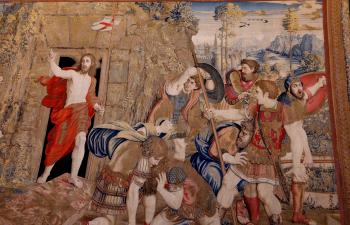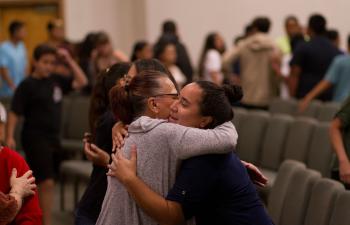We ponder a Marian curriculum of prayer provided for us in Luke’s Gospel and expounded in the Catechism.
The Catechism’s treatment of prayer in its fourth pillar is, in a number of ways, a very Marian catechesis. And that is perfectly natural, given the Catechism’s penchant for laying great stress upon the economy of salvation, which Christoph Cardinal Schönborn, the Catechism’s general editor, has called its leitmotif. [i] Mary is the great ponderer of the economy of salvation, as Luke makes clear in his Gospel. Twice in chapter 2, once after the shepherds adore the new-born Christ and again after Mary and Joseph find him in the Temple, Luke tells us that Mary ‘kept’ these events in her heart. After the first instance, at verse 19, he adds the words, ‘pondering them in her heart.’
The words themselves are worth pondering for a moment. At verse 19 the word translated ‘kept’ is in the Greek syntereo, which means ‘to keep closely together,’ ‘to conserve or to remember.’ At verse 51 the same translation, ‘kept’ is used for the related word diatereo, which means ‘to watch’ or ‘to observe strictly.’ The word ‘ponder’ is the Greek symballo, meaning ‘to throw together.’ That might not seem to mean much, until one notes that it has the same root as the word symbolon, which is the ancient label given to our Creed, or what we sometimes call in English ‘the symbol of the faith.’
Why would Luke be inspired by the Holy Spirit to tell us that Mary ‘watched’ and ‘remembered’ these events surrounding the birth and childhood of Our Lord, ‘pondering them’ [throwing them together] ‘in her heart?’ At paragraph 2599 the Catechism gives us a hint of an answer. There we are told that ‘The Son of God who became Son of the Virgin learned to pray in his human heart. He learns to pray from his mother, who kept all the great things the Almighty had done and treasured them in her heart.’ She was a Jewish mother and so she prayed, as did all of her people, out of the fund of her memories of God’s great works on behalf of His people. If Jesus Himself learns to pray from Mary, shouldn’t we, too? And so, we could conclude, that what Luke supplies for us, in the two brief verses just cited, are the rudiments of a Marian curriculum of prayer. And the Catechism echoes that in several ways in its pillar on prayer. But to fully appreciate the Marian quality of its catechesis, we first have to get a little fuller background.
The rest of this online article is available for current Guild members.
This article is from The Sower and may be copied for catechetical purposes only. It may not be reprinted in another published work without the permission of Maryvale Institute. Contact [email protected]

















